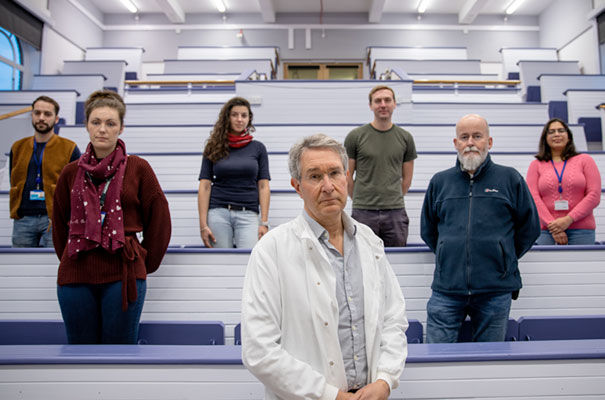DIOSynVax, a University of Cambridge spin out is to receive $42 million to develop a vaccine candidate that could provide protection against both existing and future variants of SARS-CoV-2 – the virus that causes COVID-19 – as well as other major coronaviruses, including those that cause SARS and MERS.
The investment is from the Coalition for Epidemic Preparedness Innovations (CEPI) which has offices in Oslo, London and Washington US.
It will support the development of an mRNA vaccine by DIOSynVax, which is led by Professor Jonathan Heeney, head of the Laboratory of Viral Zoonotics at the University of Cambridge.
The Cambridge team will design and select the lead antigen through proof-of-concept preclinical studies, and undertake initial clinical development through Phase I/II studies.
DIOSynVax uses the combination of protein structure, computational biology and immune-optimisation to maximise the protection that vaccines can provide against global threats including existing and future virus outbreaks. Its vaccine candidates can be deployed in a variety of vaccine delivery and manufacturing platforms.
The DIOSynVax pipeline includes vaccine candidates for haemorrhagic fever viruses, influenza, and SARS-CoV-2, the latter of which is currently in clinical trials.
If DIOSynVax’s novel antigen design is successfully deployed using the intended mRNA platform, it could potentially be used to enable rapid development of vaccines against so-called Disease X – unknown pathogens with pandemic potential that have yet to emerge.
Professor Heeney said: “We are excited to be working with CEPI on its ground-breaking mission to leverage revolutionary science and technology to outmanoeuvre and minimise future pandemic threats.
“Our approach is to be ahead of the next pandemic – to deliver custom designed, immune selected vaccine antigens – which is ideal to prevent diseases caused by complex viruses such as the large and diverse family of coronaviruses. If successful, it will result in a safe, affordable NextGen vaccine for widespread use.”
CEPI CEO Richard Hatchett added: “We’re investing up to $42m in UK-based DIOSynVax – a Biotech spinout of the University of Cambridge – to advance development of a broadly protective vaccine that could provide protection against both existing and future variants of SARS-CoV-2 as well as other Betacoronaviruses.
“Coronaviruses have now proven their pandemic potential, so it’s imperative for global health security that we invest in R & D now to future-proof the world against the threat of coronaviruses.”
At today’s Global Pandemic Preparedness Summit CEPI announced the latest award under its $200m programme to advance the development of vaccines that provide broad protection against SARS-Cov-2 variants and other Betacoronaviruses.
CEPI and DIOSynVax are committed to enabling global equitable access to the vaccines developed through this partnership. Under the terms of the funding agreement, DIOSynVax has committed to achieving equitable access to the outputs of this project, in line with CEPI’s Equitable Access Policy.
Dr Hatchett added: “The UK Government and the country’s world-leading scientific institutions have been pivotal to the global response to COVID-19. From the development of the CEPI-supported Oxford/AstraZeneca vaccine – which is used in more countries than any other – to the ground-breaking Recovery trial to evaluate life-saving treatments like dexamethasone, British science has played a leading role in protecting the world from COVID-19.”
CEPI’s programme to develop broadly protective coronavirus vaccines is a core part of its $3.5 billion pandemic preparedness plan.
Including the collaboration with DIOSynVax, CEPI has now announced a total investment of up to $135m in seven partnerships under this programme.

